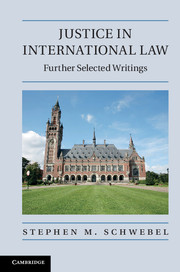Book contents
- Frontmatter
- Contents
- PART I International Court of Justice
- 1 Reflections on international adjudication
- 2 The impact of the International Court of Justice
- 3 The politics of adjudication
- 4 National judges and judges ad hoc of the International Court of Justice
- 5 The roles of the Security Council and the International Court of Justice in the application of international humanitarian law
- 6 The inter-active influence of the International Court of Justice and the International Law Commission
- 7 A site visit of the World Court
- 8 The proliferation of international tribunals: threat or promise?
- 9 The Gulf of Maine maritime boundary delimitation: the constitution of the chamber
- 10 The judgment of the International Court of Justice in the case concerning the Gabčíkovo-Nagymaros Project (Hungary/Slovakia)
- 11 Gorbachev embraces compulsory jurisdiction
- PART II International arbitration
- PART III Miscellaneous
- Collected publications, judicial opinions and book reviews
- Index
1 - Reflections on international adjudication
from PART I - International Court of Justice
Published online by Cambridge University Press: 07 September 2011
- Frontmatter
- Contents
- PART I International Court of Justice
- 1 Reflections on international adjudication
- 2 The impact of the International Court of Justice
- 3 The politics of adjudication
- 4 National judges and judges ad hoc of the International Court of Justice
- 5 The roles of the Security Council and the International Court of Justice in the application of international humanitarian law
- 6 The inter-active influence of the International Court of Justice and the International Law Commission
- 7 A site visit of the World Court
- 8 The proliferation of international tribunals: threat or promise?
- 9 The Gulf of Maine maritime boundary delimitation: the constitution of the chamber
- 10 The judgment of the International Court of Justice in the case concerning the Gabčíkovo-Nagymaros Project (Hungary/Slovakia)
- 11 Gorbachev embraces compulsory jurisdiction
- PART II International arbitration
- PART III Miscellaneous
- Collected publications, judicial opinions and book reviews
- Index
Summary
It is a pleasure to speak to the annual dinner of the American Branch of the International Law Association. It is a particular pleasure to speak to the American Branch under the Presidency of Jim Nafziger. Jim and I are old comrades-in-arms. Let me say a word about the cause in which we especially fought.
When Jack Stevenson was President of the American Society of International Law, he invited me to become its Executive Director in 1967. One of the first challenges that Jack and I tackled was making the Jessup Competition international. Its substantive concern was of course already international, but at that time all the teams were American.
I had a special interest in the Jessup Competition for more than one reason. The idea of a moot court competition on topics of international law was Dick Baxter's. Dick, with whom I then jointly taught a basic course in international law at Harvard Law School, was full of ideas: another in which he played a seminal role was the creation of International Legal Materials. Dick enlisted me to write the problem for the Competition and to serve as one of the three judges.
I have wondered since whether that was a conflict of interest. I don't think so; for one thing, like many law school professors who ask questions, I did not know the answer; for another, the Jessup Competition does not turn on the right answer but the right argument.
- Type
- Chapter
- Information
- Justice in International LawFurther Selected Writings, pp. 3 - 10Publisher: Cambridge University PressPrint publication year: 2011



